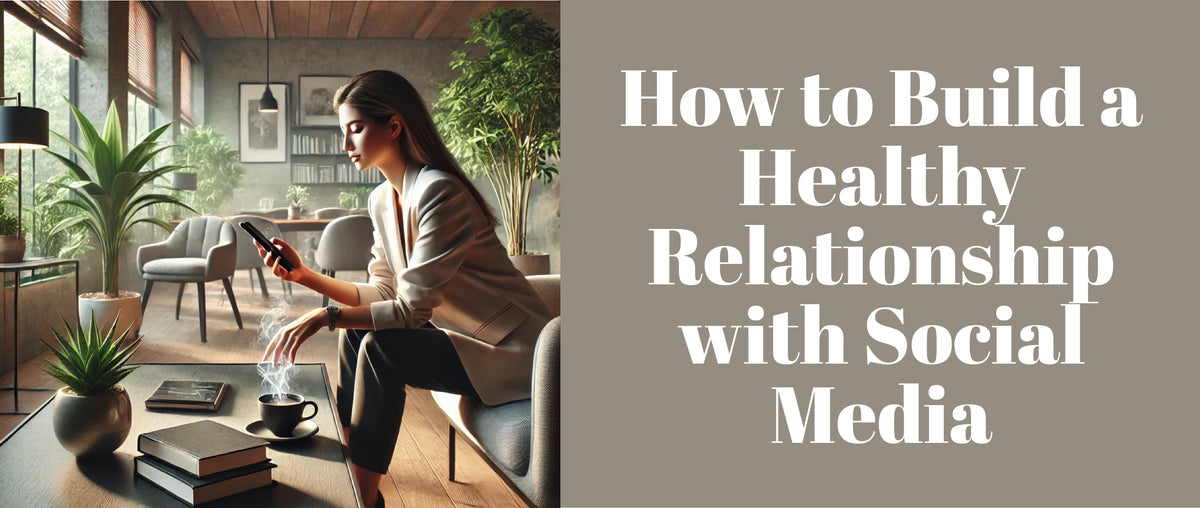How to Build a Healthy Relationship with Social Media
In today’s digital age, social media has become an integral part of our lives, transforming how we connect, share, and express ourselves. However, the impact of social media on mental health and overall well-being is complex. It can offer supportive communities, access to liver healthy foods tips, and even inspiration for a healthy lifestyle. Yet, without mindful use, social media can also trigger feelings of comparison, anxiety, and even loneliness.
This article will provide actionable steps and insights on how to build a healthy relationship with social media, focusing on mental wellness and practical strategies for positive engagement. Let’s explore how to bring balance to your digital life, cultivate a healthier mindset, and promote overall well-being.
Key Takeaways
- Set boundaries and establish mindful routines for social media use.
- Identify and manage emotional triggers to protect your mental health.
- Curate your feed with positive, uplifting content and unfollow accounts that promote negative comparisons.
- Prioritize in-person relationships and alternative activities for healthy living.
- Seek support if social media use starts to negatively impact your mental health.
Understanding Social Media’s Impact on Mental Health
Positive Aspects of Social Media
Social media can offer numerous benefits when used mindfully, such as:
- Connecting with others: Helps you stay close to friends, family, and even like-minded communities.
- Accessing valuable information: From healthy smoothie recipes to low-calorie fruits for weight management, social media provides resources that promote healthy living.
- Inspiration for personal growth: Social media can motivate us by exposing us to stories of healthy weight loss, wellness journeys, and nutritional insights, including guides on liver-healthy foods.
Negative Aspects of Social Media
However, overuse or unintentional consumption can lead to:
- Comparison: Constant exposure to curated and edited content can lead to unrealistic standards and comparisons.
- Addiction: Excessive social media use can become compulsive, impacting productivity and relationships.
- Sleep disruption: Late-night scrolling may interfere with your sleep cycle and overall health.
The key to avoiding these pitfalls is to consciously build a balanced, healthy relationship with social media.

Recognize Your Triggers on Social Media
Identifying what aspects of social media negatively affect you is essential to building a positive relationship with it. Many users report feelings of inadequacy, jealousy, or anxiety, particularly when they compare themselves to others.
Common Social Media Triggers
- Comparison with others: Seeing others' highlight reels can make us feel less satisfied with our own lives.
- Unrealistic body image expectations: Photos and trends often promote unrealistic beauty standards, which can affect self-esteem.
- FOMO (Fear of Missing Out): Observing friends’ outings or achievements can create a sense of exclusion or inadequacy.
Consider asking yourself questions like:
- Do I feel better or worse after using social media?
- What specific types of content trigger negative emotions?
- Are there accounts or posts that consistently cause stress or discomfort?
By identifying these triggers, you can begin to curate a feed that is positive, helpful, and supports mental health.
Setting Boundaries for Healthier Social Media Use
Setting boundaries around social media use is key to fostering a healthy relationship with it. Without limits, it’s easy to spend hours scrolling, which can eat into time for important offline activities like exercise, meal prep, or trying a new healthy smoothie recipe.
Steps for Setting Boundaries
- Schedule Social Media Time: Decide on specific times of day for checking social media, ideally not too close to bedtime.
- Limit Daily Usage: Set a time limit for how long you spend on social media platforms each day.
- Digital Detox Days: Consider implementing one or two days a month as "digital detox" days. During these days, focus on activities like preparing homemade meals, trying new vegan recipes, or enjoying vegan butter on toast with your favorite herbal tea.
Recommended Screen Time
| Age Group | Recommended Screen Time |
|---|---|
| Children | 1 hour/day |
| Teens | 1-2 hours/day |
| Adults | 2-3 hours/day |
Cultivate Mindful and Intentional Use
Mindful usage encourages you to approach social media with a purpose, rather than as an automatic habit. The more intentional you are, the less likely you’ll be to fall into the trap of mindless scrolling.
Steps for Mindful Social Media Use
- Define Your Purpose: Each time you open an app, ask yourself why. Is it to connect, learn something new, or relax?
- Limit Mindless Scrolling: Set an intention to focus on what’s relevant to you, such as searching for Vegan products or browsing delicious, plant based cheese options.
- Reflect and Adjust: After each session, reflect on your emotional state. Did it improve, stay the same, or worsen?
By incorporating mindfulness into social media habits, you can develop emotional awareness and enhance your overall well-being.
Avoiding Comparisons and Curating a Positive Feed
To nurture a healthy relationship with social media, try to curate your feed with content that uplifts and inspires you. Unfollow or mute accounts that consistently make you feel inadequate or promote unhealthy comparisons.
How to Curate a Positive Feed
- Unfollow Negativity: If certain accounts trigger negative feelings, it's okay to unfollow or mute them.
- Follow Positive Accounts: Look for accounts that encourage well-being, whether it’s about vegan cheese, healthy living, or unsalted butter recipes.
- Diversify Your Interests: Following a variety of interests can broaden your perspective and help prevent over-comparison. For example, follow food pages that share healthy smoothie recipes or explore creators who showcase Cashew Butter and garlic butter for plant-based diets.
A well-curated feed promotes mental clarity and helps you maintain a more balanced relationship with social media.
Practice Digital Wellness Techniques
Digital wellness involves incorporating tools and practices that support mental health and manage social media consumption. Techniques like journaling or meditation can help you be more present and lessen the impulse to reach for your phone.
Techniques for Digital Wellness
- Journaling: Write about your emotions before and after using social media. Track patterns and adjust your habits accordingly.
- Wellness Apps: Apps that monitor screen time can remind you to take breaks or gently reduce time spent online.
- Meditation: Regular meditation or breathing exercises can help you manage the stress that social media may cause.
Incorporating wellness practices ensures that your relationship with social media remains intentional and positive.
Take Regular Social Media Breaks
Taking breaks from social media can reduce stress, improve sleep quality, and allow you to refocus on offline hobbies.
How to Implement Social Media Breaks
- Start Small: Begin with 1-2 hour breaks, gradually increasing over time.
- Engage in Alternative Activities: Try cooking with plant based cheese or experimenting with fat-free cheese and other recipes.
- Manage FOMO: If the fear of missing out is strong, remember that it’s healthy to disconnect and that everyone’s journey is unique.
Regular breaks can provide a mental reset and help restore balance in your life.
Fostering Positive Online Relationships
Use social media to strengthen real-world relationships and to connect with like-minded individuals in a constructive way. Healthy online relationships can enhance your experience and lead to a more supportive community.
Tips for Positive Engagement
- Interact Constructively: Comment and engage in a positive, respectful manner.
- Build a Support Network: Follow groups or communities focused on wellness, like those sharing healthy lifestyle recipes or advice.
- Share Positively: Avoid drama and focus on sharing content that spreads positivity and encouragement.
Building supportive relationships online can foster a positive mental state and contribute to a more enjoyable experience with social media.

Understanding When to Seek Help
In some cases, it may be necessary to seek additional support if you feel social media is impacting your mental health negatively. Mental health professionals can provide guidance and strategies tailored to your needs.
Signs You May Need Support
- Feelings of Anxiety or Depression: Regularly feeling worse after using social media.
- Obsessive Checking: If social media is interfering with daily life or responsibilities.
- Increased Isolation: When social media becomes a substitute for face-to-face relationships.
If you’re experiencing these signs, consider reaching out to a mental health professional for support and resources.
Conclusion
Building a healthy relationship with social media is achievable with intentionality and mindfulness. By setting boundaries, curating your feed, and engaging mindfully, you can create a positive digital space that enhances your well-being. Prioritize your mental health by managing your digital interactions and focusing on habits that promote a balanced and healthy lifestyle.
Do you enjoy vegan food? We have a list of vegan restaurants in India to help you find delicious options in your area!










